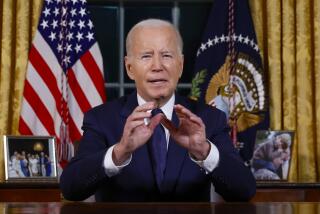Leave Pakistan alone
As Pakistan’s president, Pervez Musharraf, struggles to retain power, the United States finds itself in a familiar predicament, one that illustrates a recurring pathology in its foreign policy. Having yet again cast its lot with a strongman, Washington is confounded now that his political position has become precarious. It’s the Anastasio Somoza, shah of Iran, Ferdinand Marcos dynamic in a different guise. Though Musharraf won’t be forced into exile like those friends of Washington, the best he can hope for is to survive the current turmoil with vastly reduced authority.
The Bush administration’s problem in Pakistan is that it has had a Musharraf policy but not one that engages the interests and aspirations of Pakistan’s citizenry. Pakistanis may have welcomed Musharraf in 1999 when, as army chief, he overthrew the inept and corrupt government of Prime Minister Nawaz Sharif, but that enthusiasm has evaporated.
Pakistan’s Islamic extremists, of whom the militants associated with the Red Mosque are representative, want Musharraf dead. Al Qaeda and the Taliban, which share this sentiment, enjoy considerable support among radical Islamist circles within Pakistan. They also have established bastions in the country’s wild northwest, which Pakistani governments, like the British imperial authorities that preceded them, have never been able to control. The commercial class may be divided on Musharraf, but the professionals and intelligentsia generally revile him. In their eyes, he acquired power illegally and has retained it by serially subverting the democratic process.
There is disquiet even within Musharraf’s principal bastions of support -- the armed forces and the intelligence services. His plummeting political stock makes him a liability and threatens their political clout and vast economic empire. But if they turn to another general, Washington will again become identified with a leader who wields raw power but enjoys little popular appeal; worse, Pakistanis will hold the U.S. responsible for arranging another coup.
Faced with Musharraf’s mounting weakness, the administration has pressed him to come to terms with his nemesis, the exiled former Prime Minister Benazir Bhutto, who cannily, if transparently, has been hyping the threat posed by terrorism and Islamic extremism, knowing that this is music to Washington’s ears. She has much to gain if, under U.S. pressure, Musharraf agrees to her terms (the most important being that he resign as head of the armed forces before running for president again and guarantee that she will not be arrested on corruption charges if she returns), enabling her to come home as something of a conquering hero.
But even if the two longtime foes do come to terms, it won’t matter nearly as much as news reports here and abroad suggest. Having invoked principle and having opposed Musharraf for years, Bhutto risks being diminished politically by striking a backroom bargain with him. Already, Sharif, leader of the Muslim League (two parties bear this name, one of which supports Musharraf), has been positioning himself as the unbending defender of democracy and lambasting Bhutto for what he portrays as her clandestine maneuvers with a discredited coup-maker. Sharif also is preparing to return from exile.
Even some of Bhutto’s supporters are dismayed. They believe that Musharraf is reeling and don’t want an accord with her to be the bell that saves him.
More important, the hope the Bush administration is investing in Bhutto is misplaced and is another instance of a personality-driven policy. There is no reason to assume that she will be any more successful in expelling Al Qaeda and the Taliban from their redoubts or curbing Pakistani jihadists than Musharraf has been, and she will certainly have less support within the national security bureaucracy.
Nor will Pakistanis bless the alignment with Washington if, in fact, they elect her prime minister. To the contrary, to be seen as a legitimate, independent leader, she will have to take account of their deep disaffection with U.S. policy. The White House and much of Congress seem unaware that most Pakistanis, regardless of their political outlook, oppose their country’s role in the Bush administration’s war on terrorism. The vast majority do not support the agenda of Al Qaeda, the Taliban and their local acolytes, and have never voted for the Islamist political parties in overwhelming numbers. But most believe that Pakistan has gained little from aiding the American offensive -- it’s India with whom the United States is forging a strategic partnership. And they fear that there will be more violence and instability if Pakistan continues being a platform for Washington’s anti-terrorism campaign.
The administration’s best course of action in Pakistan is inaction. Let Pakistanis find a solution to their crisis. Any made-in-America remedy will not only fail to make matters better, it will make them worse. President Bush would do well to remember the aphorism “First do no harm” or, given his penchant for the informal, a folksier variant: “Don’t do something, just stand there.”
Rajan Menon is a professor of international relations at Lehigh University and a fellow at the New America Foundation.
More to Read
A cure for the common opinion
Get thought-provoking perspectives with our weekly newsletter.
You may occasionally receive promotional content from the Los Angeles Times.






